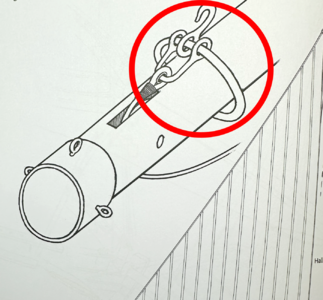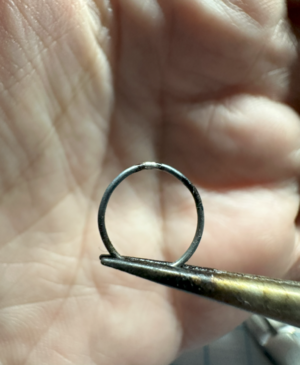I'm making a traveler for the Discovery1789. Once I've silver soldered all the parts together they are very soft because the soldering anneals them. I know that you can work harden copper but it seems contrary to beat this thing with a hammer after all the work I've put into it. Is there another way to harden copper?
-

"2025 Annual SOS Donation Drive Underway"
Please consider making a Donation to SOS to support our continuing growth and developement. It is greatly appreciated !!!
*** Read More - - Click Here ***
https://www.paypal.me/DonateSOS

You are using an out of date browser. It may not display this or other websites correctly.
You should upgrade or use an alternative browser.
You should upgrade or use an alternative browser.
No other way as far as I know. What is a traveler? Can you show the picture?
I have same problems with copper/brass after silver soldering. I try slightly shaping the members with slight moving the members back and forth. The assembly becomes stiffer.
Kurt Konrath
Kurt Konrath
Has anyone tried the old "heat and chill" method to harden copper or brass, I know it works with most iron base metals.
I tried. The method of heat and chill does not work on copper or brass.
Thanks for the pic Jim. It's too bad there is no way to harden copper other than working it. I guess I can try working the ring a bit because it's 26 ga copper and I'm afraid it will deform with just the slightest tension.
well..., why not use the brass instead of the copper? Yes, that means a re-do, but it will solve the problem. Also, you can use the soldering iron and lead-based solder instead of the torch. Steel is also another alternative, after annealing it will not be as soft as copper.Thanks for the pic Jim. It's too bad there is no way to harden copper other than working it. I guess I can try working the ring a bit because it's 26 ga copper and I'm afraid it will deform with just the slightest tension.
Brass becomes same soft as copper after silver soldering.why not use the brass instead of the copper?
My experience with solder iron was very upsetting. I was not able soldering anything as I wanted. Main problem was to secure 3 micro small parts so they do not move wen I touch them with iron. This is why I started with silver solder and torch.
If steel can be soldered, the hardness will not be a problem. Could steel be silver soldered? A negative property of steel - it will rust.
Last edited:
Brass soldering with a soldering iron could be a pain, but... it is all about the proper heat temperature for the given job, and the super-clean surface. Also, there shouldn't be any gaps between parts (even the smallest).My experience with a solder iron was very upsetting. This is why I started with silver solder and torch.
If steel can be soldered, the hardness will not be a problem. Could steel be silver soldered? A negative property of steel - it will rust.
Yes, you can solder the steel (not stainless) with silver solder. Personally, I've done this in the past. The only caveat is to blacken the soldered spot. For blackening metal (steel) I use Perma black, for silver and brass I use Brass black. Perma black will not be blacking silver soldering spots.
You're making me think Jim. Maybe I could just make the ring from steel. Hmmmm
why not? But you definitely have to aneal to make it pliable.You're making me think Jim. Maybe I could just make the ring from steel. Hmmmm
I suppose that if you dropped it directly from soldering into a pot of water it would get quite hard. Assuming I started with good steel. Piano wire or fishing wire.
No...no...it is just as simple as Dark Annealed wire made by Hillman or Tuff Stuff as an example. Any basic wire will do. Why would you need a piano wire? I am not sure how much tension you expect from the rigging.I suppose that if you dropped it directly from soldering into a pot of water it would get quite hard. Assuming I started with good steel. Piano wire or fishing wire.
Well. the steel wire will still get annealed from the soldering so it will be soft(ish). Probably nowhere near as soft as copper though. Guess I'm over thinking again.
Steel is hardened by quenching it while hot. The opposite effect occurs with copper and its alloys (brass, bronze). The traditional way to harden copper and its alloys is by mechanically work hardening it. That means forming or bending and peening. Silver soldering small copper parts will anneal them almost as much as quenching them because they are small and lose heat quickly to the air by conduction and radiation. There is no practical way of cooling small parts at a rate slow enough to have them retain their hardness, unless you have a kiln with a timer.
You could try carefully bending the small copper parts gently back and forth until the desired hardness in the bend areas is achieved. The softness of copper is the main reason why brass is used instead in ship modeling. In most cases, though, you can get away with using copper.
You could try carefully bending the small copper parts gently back and forth until the desired hardness in the bend areas is achieved. The softness of copper is the main reason why brass is used instead in ship modeling. In most cases, though, you can get away with using copper.
Good thought. I'll try working the ring to see if it stiffens up enough. The hook and shackle are small enough to be OK.
As Kurt touched on, non ferrous metals can only be hardened by "work hardening". How slow you cool will have no effect on their hardness, once they have been reached a certain temperature, the hardness has gone unless you beat or bend the living daylights out of the piece, with the exception of Stainless steel
Last edited:







